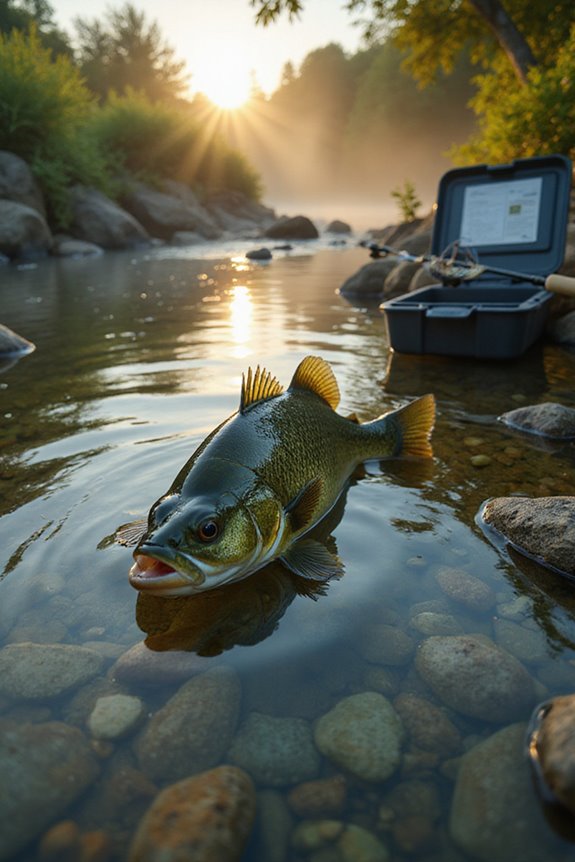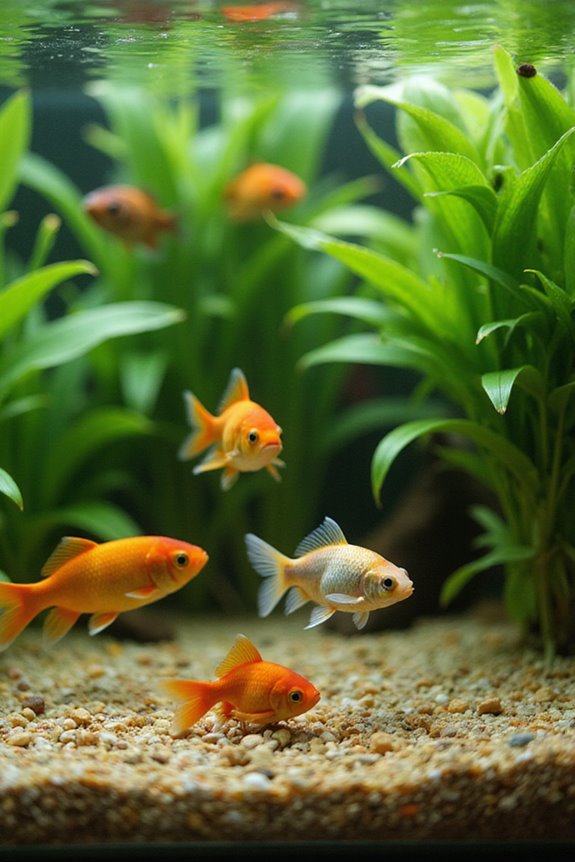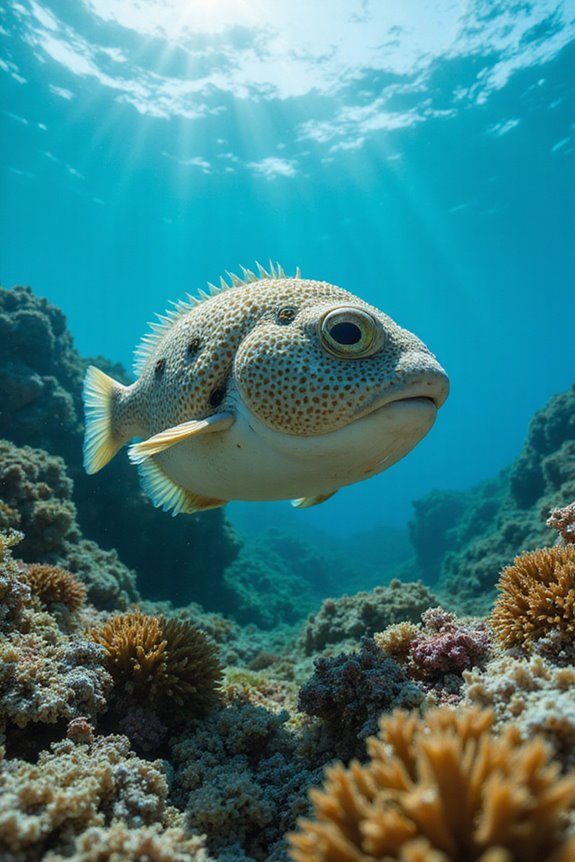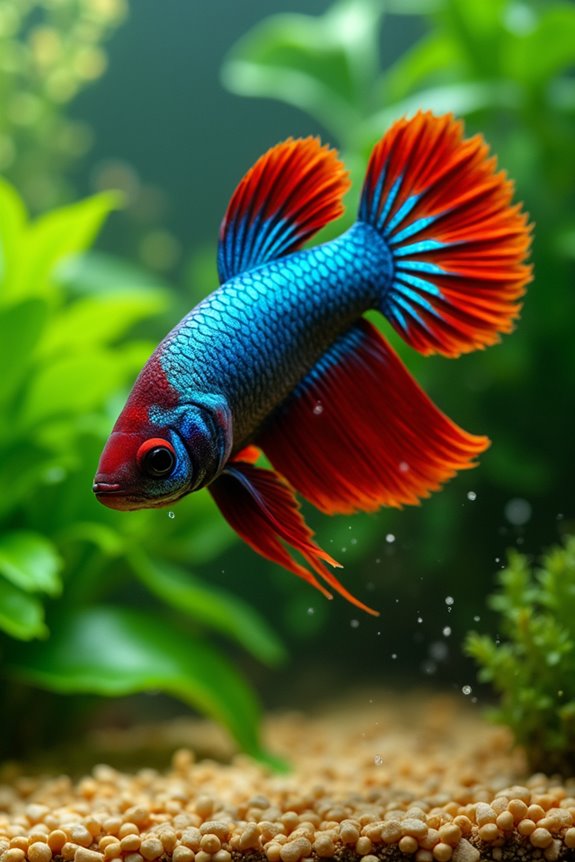Fish can generally survive without food for about two weeks, but this can vary based on species, size, and conditions in the aquarium. For example, smaller tropical fish might last only three days, while species like Betta splendens could manage over two weeks. Factors like water temperature and stress also influence fasting tolerance. To keep your fish healthy, plan feedings carefully and maintain stable water conditions. There’s more to explore about specific species and feeding strategies.
Key Takeaways
- Healthy adult fish can survive up to two weeks without food, while smaller tropical fish may last only three days.
- Larger species, like cichlids, can go a week or longer without feeding, while Betta splendens can endure over two weeks.
- Fish metabolism varies; younger fry are more vulnerable to fasting, and species’ natural habits influence their fasting tolerance.
- Environmental conditions, such as water temperature and stress levels, significantly impact how long fish can safely fast.
- To prepare for absences, feed fish a nutrient-rich meal beforehand, use automatic feeders, and maintain stable aquarium conditions.
General Duration Fish Can Survive Without Food
When it comes to how long fish can survive without food, it’s vital to understand that various factors influence this duration. Healthy adult fish generally last about two weeks without food, while smaller tropical fish may only survive up to three days due to their higher metabolic rates. Larger species like cichlids can go a week or longer, and Betta splendens can endure more than two weeks. It’s important to dispel fasting myths; not all fish can thrive during extended periods without feeding. For survival tips, guarantee your aquarium maintains stable conditions, as clean water supports overall fish health. Regular feeding routines are critical, and investing in automatic feeders can help manage their dietary needs during your absence. Modern moisture-proof technology in quality automatic feeders prevents food clumping by over 90%, ensuring your fish receive fresh food even during extended trips.
Factors Influencing How Long Fish Can Go Without Food
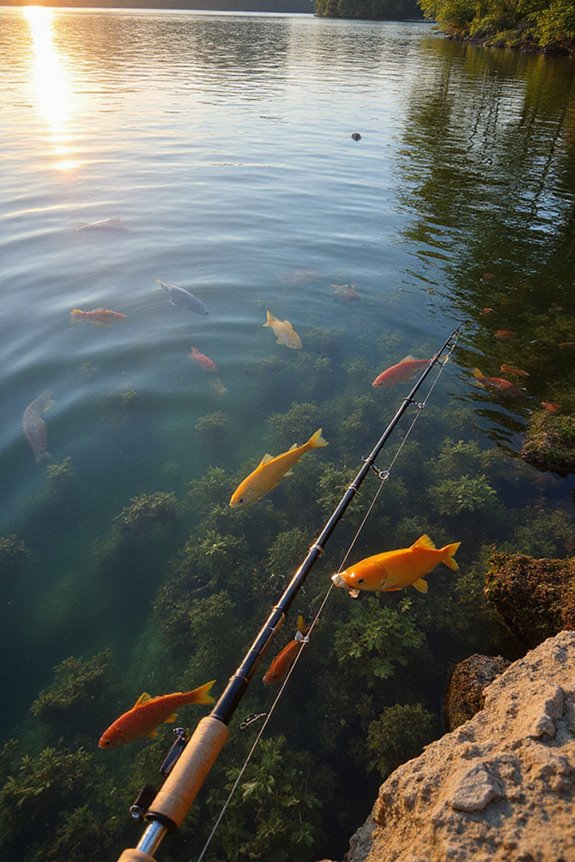
Understanding how long fish can go without food involves several factors that vary by species, life stage, and environmental conditions. Fish metabolism plays a significant role; for instance, young fry and parr are more vulnerable to fasting compared to adults, who can endure longer periods without food. The species’ natural habits also matter—migratory fish can withstand fasting due to their energy needs. Environmental conditions, such as water temperature and quality, influence fasting tolerance as warmer water increases energy expenditure. Stress responses, like elevated cortisol levels from handling, can further decrease a fish’s ability to cope with hunger. Using biodegradable fishing lines can reduce environmental stress on fish populations by minimizing the risk of entanglement and plastic pollution in their habitats. Ultimately, keeping water conditions ideal and minimizing stress can aid in ensuring fish remain healthy during fasting periods.
Aquarium Setup Age and Its Impact
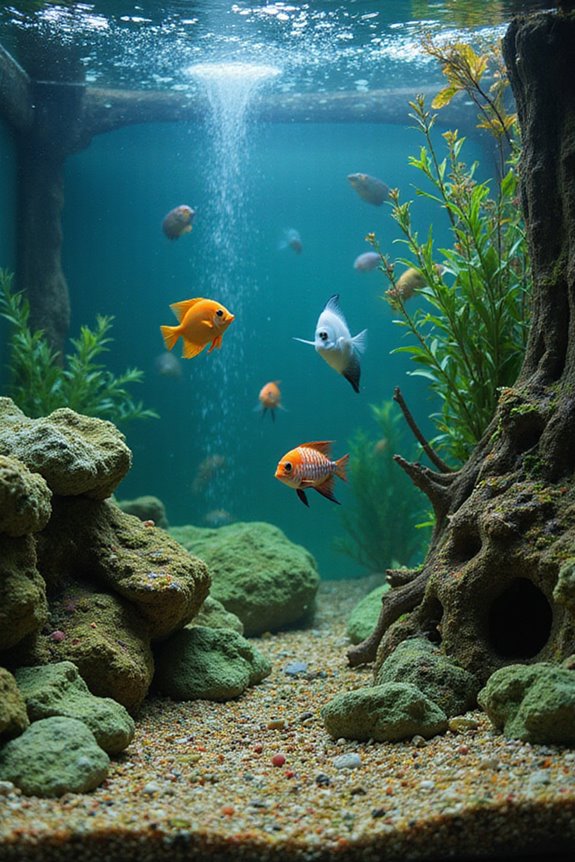
Aquarium setup age considerably influences the overall health and stability of your aquatic environment. A mature tank, typically taking three to four months to establish, supports beneficial bacteria that detoxify ammonia and nitrite. These bacteria are essential for completing the nitrogen cycle, ensuring zero ammonia and nitrite levels. In contrast, new tanks often experience “new tank syndrome,” leading to dangerous spikes in these compounds. To enhance tank maturation, consider adding natural substrates like pond mud or filter media from established aquariums. This practice accelerates beneficial bacteria colonization. Regular water testing during this period helps monitor progress. Once matured, your aquarium will maintain stable water chemistry, reducing stress on fish and promoting a healthier ecosystem for growth and longevity. Adding appropriate fish habitat structures to your tank can further enhance the aquatic environment by providing hiding spots and mimicking natural ecosystems.
Effects of Fasting on Fish Physiology and Behavior
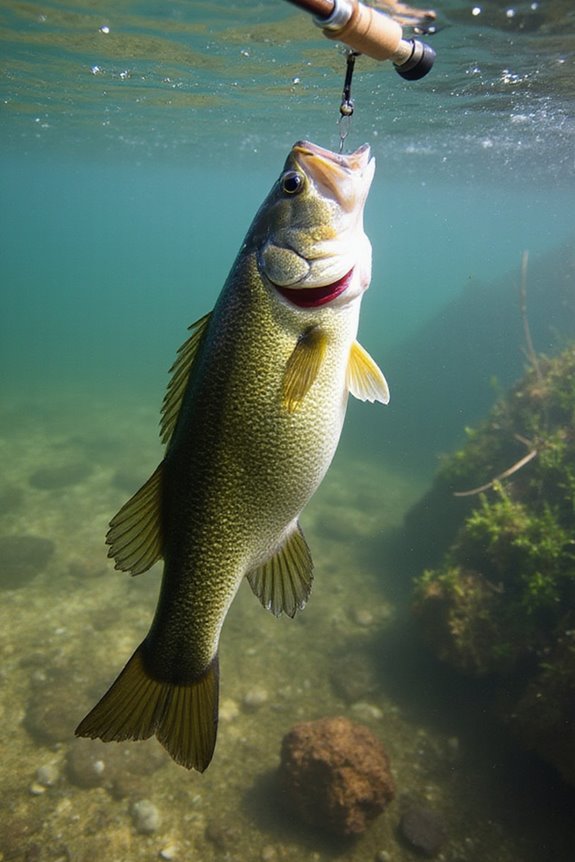
Fasting greatly impacts fish physiology and behavior, influencing their overall health and activity levels. During fasting, fish undergo metabolic adjustments, which include a decrease in their resting metabolic rate to conserve energy. As they rely on stored nutrients, lipid reserves and plasma triacylglycerides decline, while protein catabolism provides necessary energy. Behavioral changes become evident; fish may swim slower and seek shelter more often as they conserve energy. Additionally, fasting affects their digestive systems, reducing the length and integrity of intestinal villi. This can hinder nutrient absorption once feeding resumes. Understanding these effects is vital for maintaining healthy fish, whether in an aquarium or during catch-and-release fishing practices, ensuring fish survive and thrive post-fasting.
Feeding Strategies When Away or During Fasting
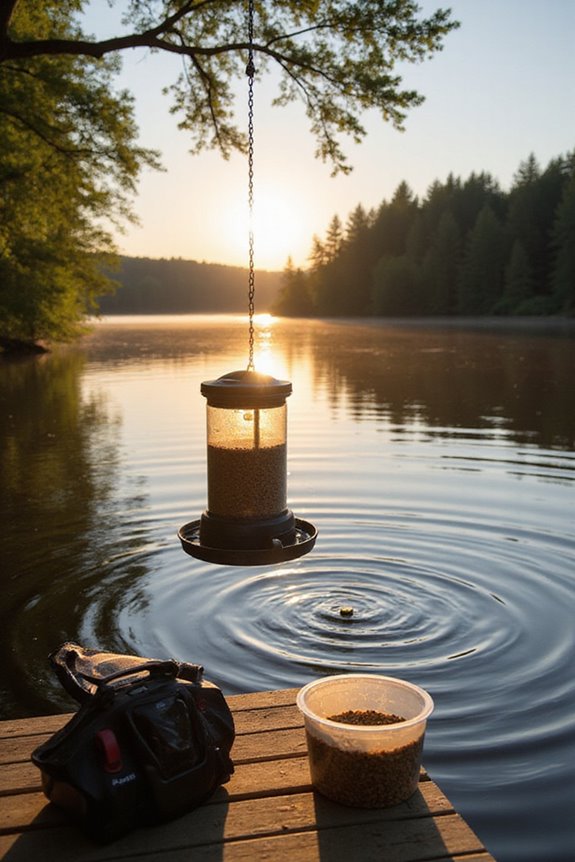
When you’re planning to be away from your fish for an extended period, having effective feeding strategies in place can make a significant difference in their health and well-being. Start by feeding your fish a nutrient-rich meal the day before you leave. This helps build their nutrient reserves. Consider using automatic feeders for shorter absences, programmed for controlled feedings. If you’re away for longer, limit feeding frequency to every other day or even less. Avoid introducing new foods right before your departure to prevent digestive issues. Also, clean the aquarium and perform water changes beforehand to maintain a stable environment. This preparation can minimize stress on your fish and guarantee they remain healthy during your absence.
Summary of Recommended Feeding Guidelines for Fish Owners
Feeding your fish properly is key to their health and well-being. I recommend establishing consistent feeding schedules, typically one to two times daily. Start with small portion sizes, allowing your fish to consume the food within 2 to 3 minutes, and remove any uneaten food after five minutes to maintain water quality. For better results, consider the type of fish: surface feeders prefer flakes, while bottom dwellers thrive on sinking tablets. Adjust your feeding amounts based on their consumption rates. For juvenile fish, provide smaller, more frequent meals using finely powdered feeds to support growth. Always monitor your fish’s behavior and adjust your feeding routines as necessary to guarantee ideal health and digestion.
Special Considerations for Different Fish Species
Understanding the specific needs of various fish species is vital for ensuring their health and well-being. Different species adaptations dictate how long fish can go without food. Carnivorous fish, with slower metabolisms, can fast longer than herbivorous species that require more frequent feedings due to higher energy needs. Larger fish tend to survive longer without food compared to smaller ones. It’s essential to take dietary preferences into account; for instance, juvenile fish need constant nutrition, while coldwater species like trout can tolerate fasting during colder months. Maintaining ideal tank conditions, such as stable water temperature, can support healthier fasting periods. Overall, knowing your fish’s unique needs will help you provide better care and enhance their well-being.
Frequently Asked Questions
Can Fish Eat Human Food During Fasting Periods?
I think fish can occasionally eat human food during fasting periods, but it’s vital to make certain it’s suitable for fish nutrition. Always choose small, safe portions and monitor their health closely to avoid issues.
How Can I Tell if My Fish Is Hungry?
I’ve noticed my fish display clear hunger cues, like swimming enthusiastically near the surface and increased activity during feeding times. Observing their feeding habits helps me guarantee they’re getting the right amount of food.
What Are the Signs of Overfeeding Fish?
Imagine cloudy water, your fish bloated and listless. Those are signs of overfeeding symptoms. I’ve learned that poor fish health often follows excess food, leading to stress, disease, and an unhappy aquarium. Keep it balanced!
Can Fasting Affect Fish Breeding Behavior?
Absolutely, I’ve noticed that fasting can greatly affect fish breeding behavior. The fasting effects often disrupt breeding triggers, leading to reduced spawning frequency and lower egg production, ultimately impacting reproductive success. It’s quite fascinating!
Is It Safe to Fast Sick Fish?
Is it safe to fast sick fish? I believe monitoring their health during fasting is essential. Fasting duration should be short, as it can aid recovery, but always prioritize fish health and consult a vet if unsure.

